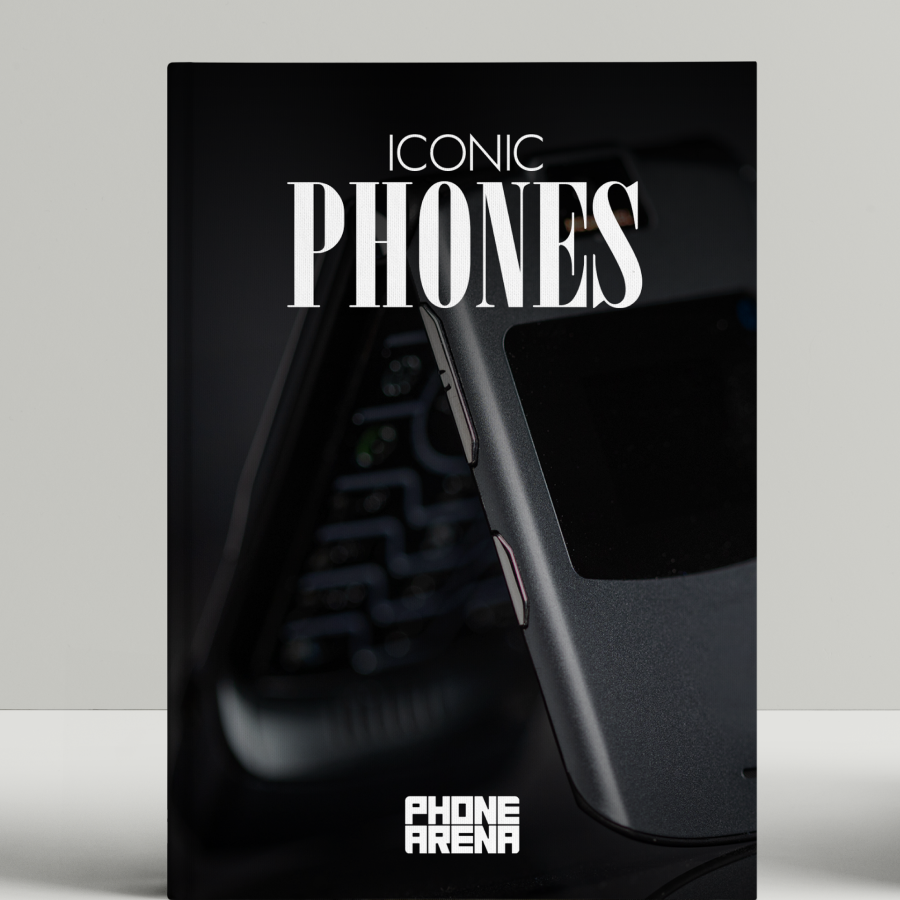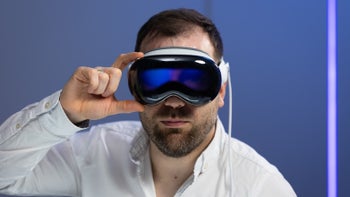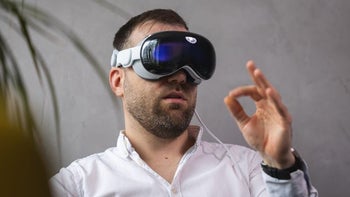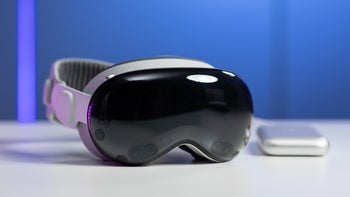Meta Quest 3: release date, news, and everything you need to know
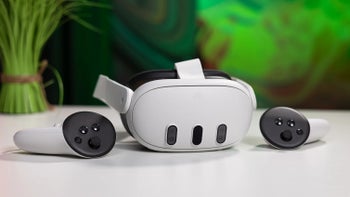
The Quest 3 released and it's aim became clear: overtake the Quest 2 as the new fan-favorite headset on the market. And for good reason! When it launched, the Quest 3 was one of the most powerful headsets around, with a hefty suite of built-in features and a very robust library of apps and games.
It didn't take long for the Quest 3 to become one of the best VR headsets. But the question on most people's mind was: how. And if you're among them, then you've come to the right place! Everything that you may need to know about the Quest 3 is available right here, on this page!

Jump to section:
Also read:
Meta Quest 3 release date
Meta officially unveiled the Quest 3 on June 1st and then launched the headset through the Meta Connect 2023 event on September 27. During the online stream, Meta confirmed that the Quest 3 will start shipping on October 10, 2023, with pre-orders going live right after the announcement was done.
| VR headset | Release date |
|---|---|
| Meta Quest 3 | October 10, 2023 |
| Meta Quest 2 | October 13, 2020 |
| Meta Quest | May 21, 2019 |
Meta Quest 3 price
When Meta officially announced the Quest 3 on June 1st, it also confirmed it's starting price: $499. Oddly enough, the Meta Quest 3 got price adjustments in numerous regions just prior to Meta's official launch event for the headset, but that didn't affect prices in the US:
- $499 for the 128GB model
- $649 for the 512GB model
This is basically just a bit over $100 higher than what the Quest 2 (with the same storage configuration) cost when it first launched. For reference, the Quest 2 started at $399 for the base model with 128GB of storage, and had a second $499 variant with 256GB of storage.
Just before the Quest 3 actually released, one of the most prominent industry analysts released a troubling report, which basically indicates that AR/VR tech from Meta is expected to sell 50% less units by the end of 2024, when compared to 2022.
Chief concern among the ones listed is the price bump that the Quest 3 has seen when compared to the Quest 2, but that is also something that falls in line with other recently released pieces of tech and their relative price jumps, as seen on the Pixel 8 and the iPhone 15.
Meta Quest 3 Specs
| Quest 3 specs (speculated) | |
|---|---|
| Display technology | LCD, 4K+ Infinite Display, with 1218 PPI and 25 PPD |
| Display resolution | 2064 x 2208 |
| IPD Range | 53 to 75 mm |
| Display peak brightness | 100 nits |
| Refresh rate | 72 Hz to 90 Hz, with an experimental 120 Hz mode being available |
| Storage | 128 GB 512 GB |
| RAM | 8GB |
| Processor | Snapdragon XR2 Gen 2 |
| Sound | Dual speakers Spatial audio 3.5mm headphone jack |
| Operating system | Quest platform, Based on Android |
| Weight | 515 grams |
| Announcement date | June 1, 2023 |
| Release date | October 10, 2023 |
| Price | $499 for the 128GB model $649 for the 512GB model |
Meta Quest 3 reviews
As outlined in our full review of the Quest 3, this latest headset from Meta is a meaningful, worthwhile upgrade over the Quest 2 — and in many ways, over the Quest Pro too. As you've seen from the specs alone, this is the first headset to sport the latest and greatest XR-centric chip from Qualcomm and it shows, for sure.
But the Quest 3 isn't just about hard stats: it's about what it allows you to do with those. For example, passthrough is better than ever and even though Meta hasn't unleashed the full suite of AR and MR features yet — those are promised to come in 2024 — some MR experiences are available and they are worth checking out.
Technological improvements have allowed Meta to deliver all of this oomph to a smaller and sleeker formfactor. But you know what? It still offers an impressive library of standalone apps and games. There is loads to enjoy through the beautiful screens of the Quest 3, with tons more on the way.
Thanks to the way that the headset works, some games look better out of the gate, while others have gotten special updates to take their visuals to a whole new level. But, of course, the Quest 3 offers proper PC VR support too, even though the experience through Meta's conventional tools remains iffy at best.
Even if the Quest 3 itself is more elegant this time around, it's not as comfortable as one would expect, or at least when used with the strap that it comes with. Luckily, there are alternatives offered by Meta, but those are going to cost you. It's pretty sad to see that this amazing headset is getting bogged down by bad strap design.
Some people are concerned over the price increase, when compared to what the Quest 2 used to cost on launch, but this is neither shocking, nor unfair. Nobody likes price increases, but this one has affected the entire tech industry, with even some of the most notable phones from recent times seeing similar price increases.
Regardless if you're upgrading from a last-gen headset to the Quest 3 or are looking to become an VR enthusiast, the Quest 3 is your best pick. It can get you acquainted with all aspects of the XR industry, allow you to play games and if the promised MR features are as good as Meta says, then getting some work done won't be out of the question either.
Meta Quest 3 comparisons
There is no point in beating around the bush: the Quest 2 was the fan-favorite VR headset of yesteryear and the Quest 3 is certainly looking to dethrone it.
And, for the most part, for good reason. While the Quest 2 is still your best option for a budget-friendly headset, it is still important to outline what the Quest 3 improves over its predecessor. So, if we compare the Quest 2 to the Quest 3, what has changed?
The most obvious difference is the CPU and the screens. The Quest 3 is the first headset running on the Snapdragon XR Gen 2 chip, which allows it to achieve all sorts of shenanigans. Said shenanigans are visible through beautiful, high-resolution displays that can offer a refresh rate up to 120 Hz, which is certainly appreciated.
The Quest 3 has two extra cameras and a depth sensor, which it uses in order to track your upper body. It can even do some AI-fueled guesswork to estimate the position of your legs!
On the surface, the Quest 3 is also slimmer and lighter than the Quest 3, although the Quest 2 is a bit more comfortable when you compare the two with the strap that is included in the box.
Overall: yeah, the Quest 3 is a significant improvement over the Quest 2. Especially if you're gig is AR and XR, then going for the Quest 3 is your best option. If you just want to test the waters and see what this VR business is all about, the Quest 2 is still a great option for a cheaper headset.
Controllers
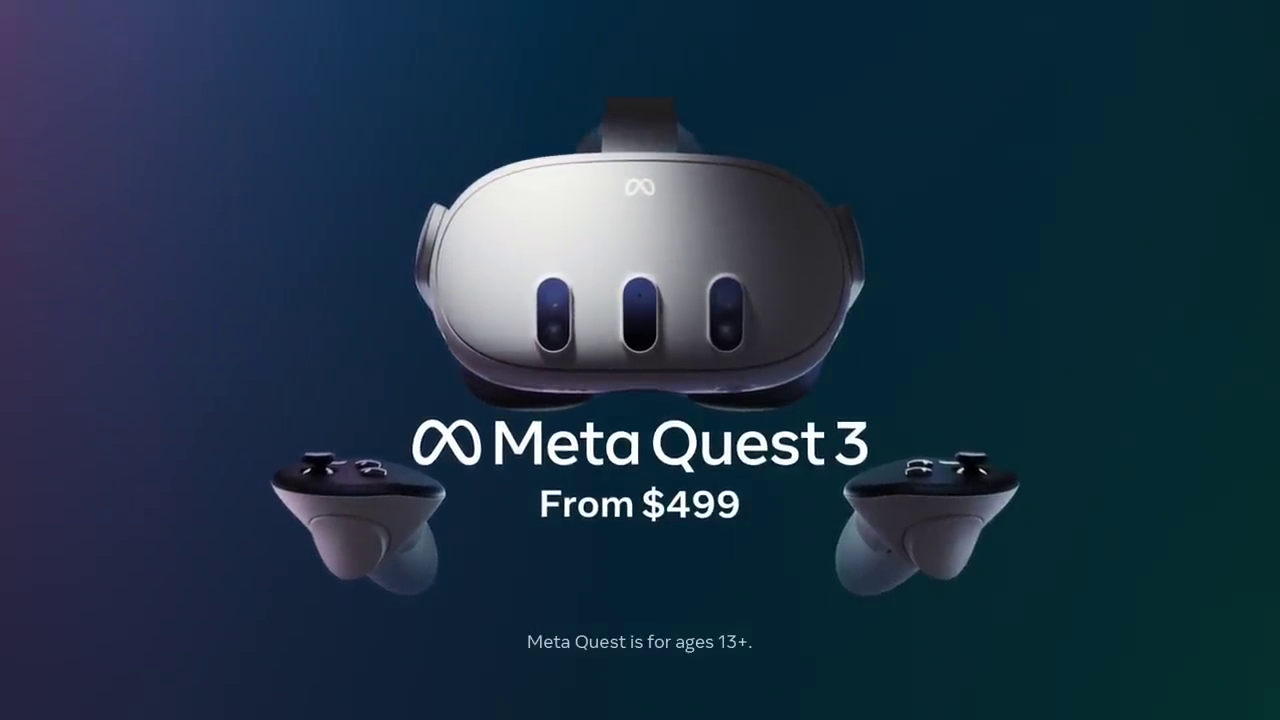
Quest 3 and its controllers, official image
Meta is quite ahead of the competition when it comes to controllers. Those ugly plastic rings that most controllers come with? Yeah, those are used for hand tracking. And the Quest 3 doesn't need those at all.
Now, that isn't to say that the Quest 3's controllers are magical: they still feature sensors, but they are very well positioned and very well hidden. And they work just fine, without any issues when it comes to hand tracking.
Plus, the controllers are really comfortable too. They are similar to the ones on the Quest 2, for example, save for the aforementioned plastic rings. That is to say that if you've ever used a Quest headset in the past, then you'll be able to find our way around the Quest 3's controllers rather quickly.
Now, the somewhat expected elephant in the room is that the controllers still use AAA batteries. That being said, the Quest Pro's controllers are compatible with it and they feature rechargeable batteries, so you have that option so long as you're willing to spend more on top.
The haptics on the Quest 3's controllers feel a bit better though. Meta is calling the upgrade TruTouch, but it's difficult to explain the improvement itself through words alone. Those of you who are into tactile sensations will notice the difference and appreciate it immediately.
Meta Quest 3 features and software
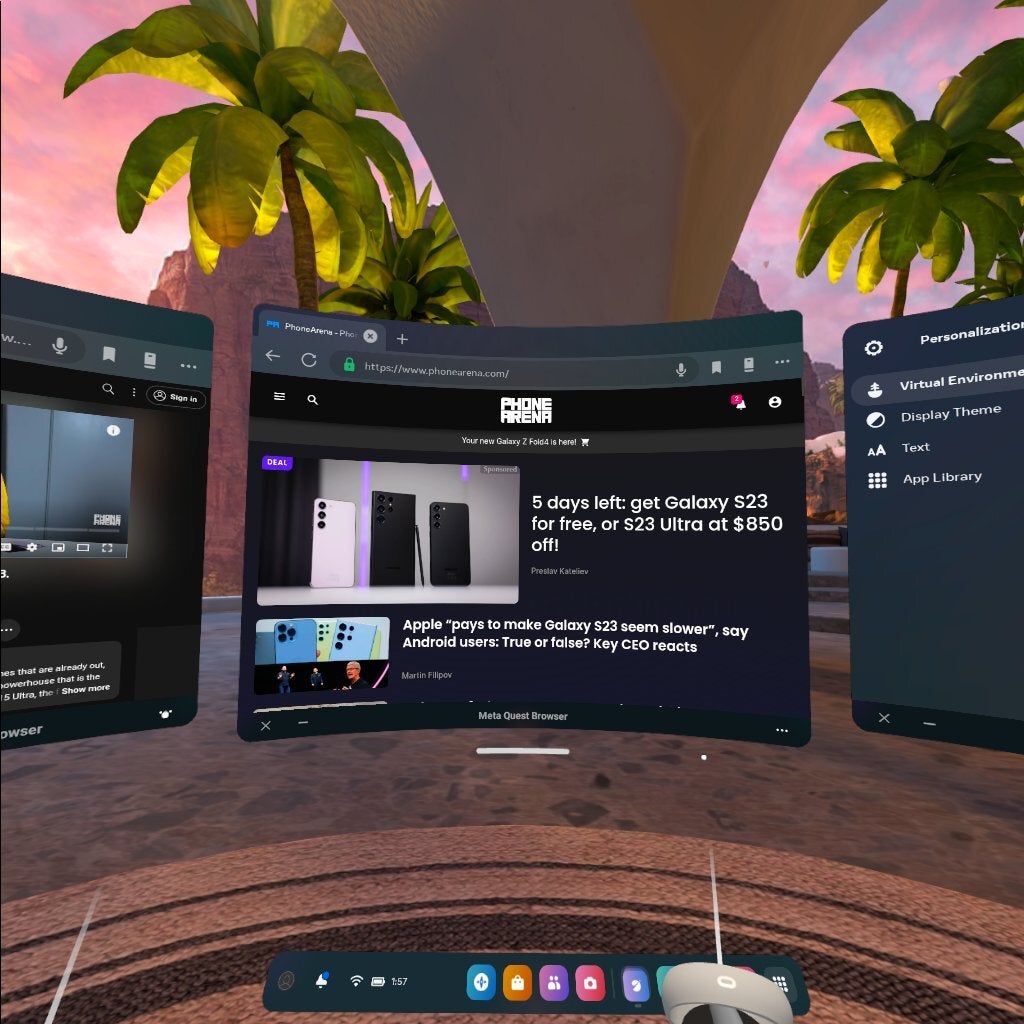
Multi-window multitasking on the Quest 2
The Quest 3 introduced a slew of new features, some of which are exclusive to the platform, while others are also to be released to the Quest 2 and Quest Pro. Here are, however, the most interesting among them:
- Vision Pro-esque AR support, that lets you position virtual objects in the real world (will be coming in 2024)
- Built-in upper-body tracking, no trackers required!
- AI-Generated legs that estimate the real-life position of your legs
- Microgestures: Next-level hand-tracking and controller-less navigation
And then you have the cold, hard facts like the Quest 3 being 40% louder and 40% lighter than the Quest 2, while still being equipped with a significantly more powerful SoC, for about $100 on top of what the Quest 2 used to cost.
Meta also announced the ability for users to stream Xbox Game Pass games on its Quest headsets, which includes the Quest 3, but also the Quest 2 and the Quest Pro. Now, bear in mind: these aren't native ports of the games, but streamed versions, so a solid internet connection will be required. So will a Game Pass subscription and an Xbox controller. Oh, and the games will just be flat-screen versions, but hey: you can play them!
While we're on the subject of games, one of the PC VR hits, Red Matter 2, got a visual overhaul, especially designed for the Quest 3. And the trailer that the developer released to commemorate the occasion serves as a pretty solid comparison between the graphical capabilities of the Quest 3 and the Quest 2. Take a look:

One of the Quest 3's prime features is the ability to allow games a higher graphical fidelity, which numerous devs (like those of Red Matter 2) have taken advantage of and released updates with graphical overhauls, especially aimed at the Quest 3.
While that sounds awesome, it has come with an unwanted side-effect: it has increased file size for the Quest 2 versions of these apps and games too, because right now, Meta doesn't offer device-specific software versions.
Besides its notable design changes, perhaps the Quest 3's most notable feature is color passthrough, and a generally stronger focus on augmented reality (or mixed reality). Experiences that highlight this prowess remain limited in 2023, but Meta has promised more to come in 2024.
Despite the difference in some specs between the Meta Quest 3 and the Meta Quest Pro, it would appear that Meta is aiming to offer an enterprise solution with the Quest 3 moving forward, but through a subscription-based service.
Meta Quest 3 Accessories
In typical Meta fashion, the Quest 3 has a ton of accessories available for it, right out of the gate. While some are what you'd typically expect, others may turn into must-have purchases, as they are tied to the experience that you are looking to get out of the Quest 3.
So, in terms of the must have accessories for the Quest 3, here's the things that you should know:
- The default strap of the Quest 3 is rather uncomfortable, so investing in a separate one is a solid idea
- Budget-friendly and colorful sets of straps and facial interfaces are available if you plan to share your headset with others
- The headset comes only with a charging cable, so if you're excited for a PC VR experience, a Link Cable is a must-have
- The Meta Quest 3 has a charging connector, so there is a dock available too
- A carrying case means that the Quest 3 becomes truly portable, so it's always worth picking one up
That being said, as time passes, we're sure to see loads more third-party options for accessories become available, so make sure to check what's available before you commit to a purchase. After all, not everyone has the same expectations when it comes to things such as straps for example, so if you've had a good experience with certain brands in the past, then it's worth checking if they haven't released something for the Quest 3 too.
Should you wait for Meta Quest 3?
You should get a Quest 3 if you don't own any other headset or you are interested in mixed-reality and AR features. Right now, the Quest 3 is the most powerful headset that you can get for this price and in exchange, you'll be able to enjoy VR, MR and AR apps and games for years to come.
You should not get a Quest 3, however, if you already own a Quest 2 — or another headset of its level — and you're happy with it. After all, not everyone will be interested in taking advantage of the new features that the Quest 3 has to offer. If you're just interested in checking out what VR has to offer, the Quest 2 is still a great option.
All that being said, if you can afford the extra cash and get a Quest 3, you won't be disappointed. It's not some sort of major leap in terms of XR tech, but Meta has just enough experience to be able to offer a solid and welcoming VR experience with just enough nifty features that would make you go "wow".
